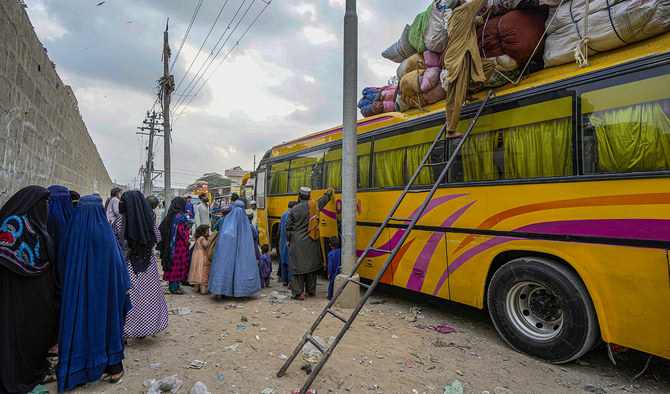KARACHI: As Pakistan gears up to forcibly repatriate illegal immigrants residing in the country, abandoning their homes isn't the only conundrum for Afghan nationals like Hikmatullah Khan in the southern port city of Karachi. Selling off their properties, for the right prices, is another headache.
Pakistan’s caretaker government handed a strict ultimatum to illegal immigrants residing in the country last week—leave before Nov. 1 or face deportation. The announcement was criticized by the Afghan government and rights groups but Islamabad, wary of a steep rise in militant attacks in recent months and a crippling economic crisis, seems adamant on carrying out the threat of repatriation.
Officials say hundreds of thousands of Afghans have traveled to Pakistan since foreign forces left Afghanistan and the Taliban took over Kabul in 2021. Even before then, Pakistan hosted some 1.5 million registered refugees, one of the largest such populations in the world, according to the United Nations refugee agency. More than a million others are estimated to live in Pakistan unregistered.
With the deadline for illegal immigrants to leave the country and the threat of deportation fast approaching, many Afghan families have started leaving for Afghanistan. Taking advantage of the situation, locals are offering throwaway prices for their assets.
“My house is located in the Mominabad area near Sohrab Goth in Karachi and its market worth is about Rs3 million ($10,661),” Hikmatullah Khan told Arab News on Sunday. “But now people are coming to buy and are offering only Rs1.5 million ($5,330) for it.”
Hikmatullah Khan said his father, who arrived in Karachi about 40 years ago, bought their house a few years earlier.
“They [buyers] know we are compelled and facing an uncertain future in Pakistan, so they are coming to exploit the situation,” Khan, a father of five, added.
Another Afghan resident of the nearby Junejo Colony in the same Mominabad area, Hakeemullah Khan, said he owns a flat worth Rs2 million ($7,107). He too complained buyers were purposefully offering low rates for the flat.
“One of my neighbors offered to buy the flat for only Rs1 million ($3,553) despite knowing its market value,” Hakeemullah Khan told Arab News. His parents hail from the Mazar-i-Sharif city in Afghanistan.
“It is our hard-earned assets, and we are not supposed to sell them at fire-sale rates,” he said. “It is time to support, not to exploit us.”
As the future remains uncertain for Afghan nationals who have called Pakistan home for decades, selling even movable assets for the right prices is becoming difficult.
“We bought a refrigerator for Rs150,000 ($533) last year and we were forced to sell it for only Rs30,000 ($106) a couple of days ago,” Ismail Khan, another Afghan national, told Arab News.
Ismail Khan was busy loading his household items on a bus headed for the Pakistan-Afghanistan border crossing in southwestern Chaman.
Ismail Khan said he and his relatives were forced to sell valuables that were impossible to take to Afghanistan at throwaway prices simply to dispose of them.
Afghans in Pakistan’s Karachi and other cities have complained of harassment and intimidation by police in recent weeks. Due to considerable delays in the registration process, many Afghans who fled after the Taliban took over Kabul in August 2021 do not hold Proof of Registration (PoR) or Afghan Citizen Card (ACC). Many arrived in Pakistan on regular visas which have since expired, according to the UNHCR and Afghan nationals.
“Yesterday I was coming home from work and on the way, I was stopped by a police van,” Naseebullah Khan told Arab News on Monday.
“They asked for an identity card, which I don’t have, so they threatened to arrest me,” he added. Naseebullah Khan said he was allowed to go home after he bribed the police officials.
A transporter at a bus stand from where Afghan refugees head back to their country told Arab News that the number of buses from Karachi to Chaman has increased to 9-10 per day from the previous figure of 1-2 in recent days.
Pakistan’s information minister and the home minister of Sindh did not respond to queries when this report was filed.















